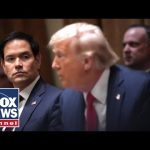The recent viral video capturing a heated exchange over political preferences at the voting booth serves as a microcosm of the deepening political polarization in America. What began as lighthearted banter about votes for Nixon and Kennedy quickly spiraled into a contentious debate when Donald Trump entered the conversation. One individual’s outright disdain for Trump voters escalated the situation, exposing the selective tolerance that has become emblematic of today’s political discourse. This incident underscores the troubling trend of ideological rigidity, where friendships and social bonds are increasingly defined—and severed—by political affiliations.
The video highlights a growing intolerance among certain segments of society, particularly toward conservatives and Trump supporters. The individual who declared they could not be friends with Trump voters revealed an ironic contradiction: their self-proclaimed commitment to tolerance evaporated when confronted with opposing views. This selective tolerance is emblematic of a broader societal issue, where ideological extremity often leads to exclusion rather than dialogue. Such behavior not only undermines the foundational principles of free speech and diversity of thought but also deepens societal divides.
Amidst the chaos, another individual in the video emerged as a voice of reason, advocating for relationships that transcend political differences. This perspective is refreshing in an era where partisan animosity often overshadows shared values and common ground. It serves as a reminder that political disagreements should not dictate personal relationships or reduce individuals to caricatures based on their voting choices. The ability to engage respectfully with differing viewpoints is essential for maintaining the fabric of civil society.
This incident also reflects the broader phenomenon of affective polarization, where partisan identities have become deeply entrenched and emotionally charged. Social media platforms exacerbate this divide by creating echo chambers that reinforce existing biases and discourage meaningful dialogue. As people increasingly consume ideologically congruent content, their willingness to compromise diminishes, fostering an environment of hostility and mistrust. The consequences are far-reaching, from legislative gridlock to the erosion of democratic norms.
Ultimately, this viral moment serves as both a cautionary tale and a call to action. Political differences should inspire debate, not division; they should challenge us to think critically rather than retreat into ideological silos. As America grapples with its polarization crisis, it is imperative to reclaim the values of mutual respect and open dialogue. Only by embracing these principles can we hope to bridge the divides that threaten to unravel our social cohesion and democratic institutions.




